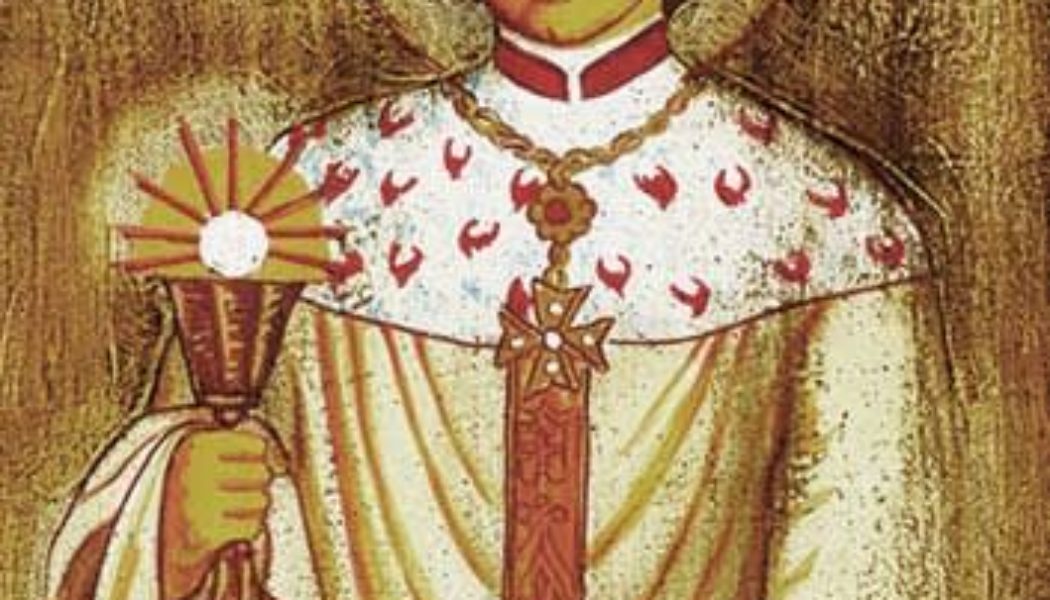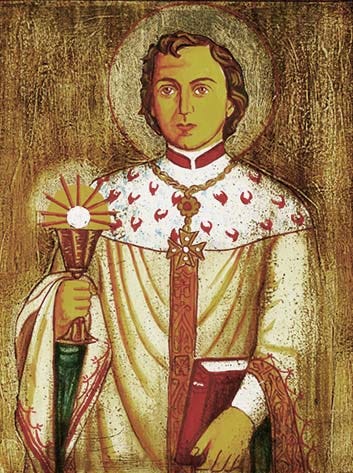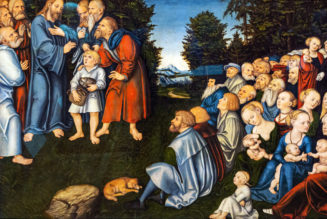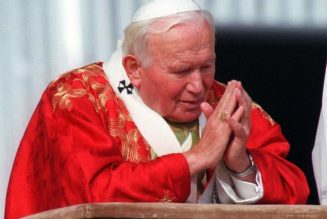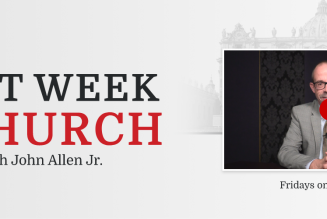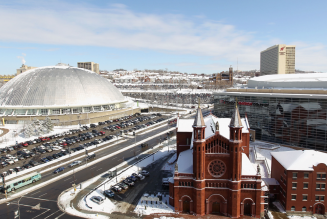Hey everybody,
After a three-day weekend I hope you enjoyed, this is the Tuesday Pillar Post. Because yesterday was Labor Day, and the final day to hang out at the pool with my kids, this newsletter is hitting your inboxes just a little bit later than usual.
But to make up for it, we’ve got some pretty interesting stories for you this week. And this picture of St. Cloud, whose feast is celebrated today:
Cloud, or Clodoald, was a Merovingian prince, whose father died when Cloud was young. His uncles tried to take the throne by killing Cloud and his brothers; the brothers were killed, but Cloud, who was only five, found sanctuary living with the Bishop of Rheims, France.
At 20, Cloud renounced his claim to the throne, and lived as a hermit for 11 years, deep in the forest. Feeling the need to serve more overtly, he was ordained a priest in 551 a.d., and lived as a peasant parish pastor. Eventually, his uncles heard about that development, began to feel guilty, and handed over to Cloud vast tracts of land and a couple castles. He sold most of that and distributed the money to the poor, keeping only a little to build a small church.
Eventually, a community of priests and laity dedicated to serving Christ and the poor gathered around Cloud. He died at 38 on Sept. 7, 560, and was venerated as a saint almost immediately.
St. Cloud, patron of the Dioceses of St. Cloud, France and Minnesota, and patron of guys with very cool names, pray for us!
The News
Synodality is like a flower
Guidelines and preparatory documents for the Vatican’s two-year synod on synodality process were released in Rome Tuesday morning. Vatican officials said at a press conference that the guidelines are meant to be a resource, but that every local church must find its own best means of “living” the synodal process.
When the panel was asked by journalists to provide a “precise and concise definition” of synodality, Dr. Myriam Wijlens said it would be an “injustice” to the concept of synodality to define it ahead of the synodal process.
Wijlens, who teaches canon law at Erfurt University in Germany, compared synodality to “a flower,” which cannot be properly described before it has had a chance to bloom.
The preparatory documents pose a “fundamental question” to be answered by each local Church. Read about that, and more, right here.
There is a lot to analyze and break down here. Rest assured, at The Pillar we’ll have serious analysis on the synod on synodality’s documents later today.
We will, almost certainly, pay special attention to the font:
—
The Anglican patrimony
Church of England officials announced last week that Anglican Bishop Jonathan Goodall will step down from his post to become a Catholic this week.
For context and background, we had a delightful conversation with Fr. James Bradley, who converted to Catholicism as an Anglican deacon. Fr. Bradley talked about his own conversion, the social costs of leaving behind an entire life, what the “Anglican patrimony” actually is, and the joys of priestly life and ministry.
I think we often take grace for granted because it’s so super-abundant. We experience it all the time in such wonderful ways, but when you have an opportunity to stop and look back and see what the Lord has done, it’s in those moments that you realize the effect and the importance of that grace.
Certainly I can see the Lord’s hand sort of steering things all the way through those years for me.
For more, read this. You won’t regret it.
—
‘The very essence of familial love’
In India, and other developing nations around the world, family poverty is the most common reason that children are raised in orphanages — even if their parents and other relatives are alive.
Catholic Relief Services is aiming to change the paradigm — to encourage models of charity that make it easier for children to live in their own family homes, and to provide the resources and money which make that possible. This is a big shift, and while there has been resistance, there have also been positive outcomes for many children.
Read about the project, and the stories of its families, here.
—
September 5 was the Feast of Saint Teresa of Calcutta. Famously, of course, Mother Teresa gave her life to the poorest of the poor, which is now central to the charism of the Missionaries of Charity.
So we found ourselves wondering last week how it happened that religious sisters who serve the poorest of the poor came to the United States, one of the wealthiest countries in the world. Perhaps you’re curious too. Well, read up, because here’s the answer — and more about the work of the Missionaries of Charity.
(As a personal aside, in the Flynn family we attribute the existence of our youngest son to the intercession of Mother Teresa. Our oldest two are adopted, and we didn’t expect to have any children the natural way. But at Mother Teresa’s canonization in 2016, my wife Kate asked the new saint to intercede for us. She also made a quick pilgrimage to the tomb of Padre Pio, where she prayed for the same. Well, a month or so after that pilgrimage, we discovered we were pregnant. So we owe Saint Mother Teresa a debt of gratitude!)
A ‘duty to challenge’
The White House and the Speaker of the House proved themselves last week to be thoroughly livid over a Texas law that aims to prohibit most abortions in the state, and over the Supreme Court’s willingness to let the law stand while it inevitably winds its way through litigation.
Catholic House Speaker Nancy Pelosi said the Court’s decision sharpens an imperative to codify legal protection for abortion into federal law. Catholic President Joe Biden went even further, pledging a “whole-of-government” response to the Texas law, and prompting a pledge from the Justice Department to “protect” women seeking abortions in the state.
In response to the activity of those Catholics — one of them, Pelosi, being resident in his archdiocese — San Francisco’s Archbishop Salvatore Cordileone published a column in the Washington Post on Sunday, which said it was “especially disturbing” to see Catholics on the “wrong side of the preeminent human rights issue of our time.”
Cordileone argued that it is appropriate and important for bishops to intervene with “prominent laymen in public life who openly oppose church teachings on abortion.”
The archbishop said abortion is a grave moral evil, and that “you cannot be a good Catholic and support expanding a government-approved right to kill innocent human beings.”
“This is hardly inappropriate for a pastor to say. If anything, Catholic political leaders’ response to the situation in Texas highlights the need for us to say it all the louder.”
Cordileone’s column offered the Church’s teaching on abortion unambiguously. It challenged Catholic politicians who find arguments to exempt themselves from its political implications. And — in a move that has been widely praised as courageous — Cordileone committed himself to continuing to teach Catholic doctrine on the subject, and seemed to call other bishops to do the same.
Now, here’s the uncomfortable question: To what end?
The U.S. bishops have been speaking out against legal protection for abortion since at least 1973. They’ve identified opposing legal abortion as the “preeminent” political priority of their conference, and they’ve put an extraordinary amount of time and energy into explaining why legal protection for abortion is an injustice against life, and offensive to Catholic teaching and sensibilities on the nature of the state itself.
Their rhetoric has probably encouraged countless Catholics to work in practical and tangible ways to oppose abortion. It has probably made an impact at the state level, where state Catholic conferences have often quarterbacked lobbying efforts to see legislatures pass limits on abortion, sometimes in-hand with expanded social safety nets for mothers and children.
At the federal level, the bishops’ conference has helped to keep the Hyde Amendment in place since 1980, effectively prohibiting federal taxpayer funding of abortion.
But there is little evidence that any of the bishops’ statements, no matter how loud, have deterred Catholic politicians from taking permissive stances on abortion, or even from going on the offensive.
The political trajectory of Biden himself is illustrative. While bishops have been talking, issuing statements, organizing campaigns, and otherwise saying that Catholic politicians ought not support legal protection for abortion, Biden has “evolved” on the issue: In 1973, he thought Roe vs. Wade went “too far,” and by last week, he was promising to marshal the resources of government against a state and the Supreme Court to protect it.
In Biden’s case, the talk, including a 2006 document which argued that pro-choice politicians shouldn’t receive the Eucharist, has had no effect. Nor has it had much effect on Cordileone’s own subject, Rep. Pelosi. She too remains a practicing Catholic while advocating for dramatically expanded legal protections for abortion.
A cynic would say that Cordileone and his ilk already know the talk doesn’t do much, but they publish op-eds in the Washington Post in order to bolster their pro-life bona fides among those practicing Catholics who are scandalized by Biden’s position on abortion.
I am not a cynic.
In fact, I think that bishops like Cordileone, calling for “louder” responses to pro-choice Catholic politicians, are motivated sincerely by real concern for the unborn killed by abortion, and often motivated sincerely by real concern for the eternal souls of politicians advocating to protect the practice.
Still, the call for “louder” responses is demonstrably insufficient, since, in case after case, the bishops’ voices seem to fall on deaf ears.
I think bishops like Cordileone probably recognize that Biden is not going to open the newspaper Sunday morning, read a column from a bishop, and reverse his stance on abortion. But I also think those bishops are a little bit uncertain about what exactly they should do, as it is manifestly clear they are not being listened to.
At this point in the conversation, many Catholics begin to say it’s obvious what bishops should do: Prohibit pro-choice politicians from receiving the Eucharist. Stop talking, as it were, and start doing, following the very example Cordileone cited in his column, that of Archbishop Joseph Rummel, who excommunicated the segregationists who opposed his efforts to desegregate Catholic schools and churches.
Cordileone wrote that Rummel’s action is an inspiration. And like other bishops, he has in the past voiced express support for the prospect of prohibiting pro-choice Catholic politicians from receiving Holy Communion.
But for the most part, it hasn’t actually happened.
So why haven’t bishops speaking out — bishops like Cordileone — done more than talk? Not sanction politicians with the penalty of excommunication itself, which isn’t a viable canonical option in these cases, but prohibit them from receiving the Eucharist — a move which Cardinal Joseph Ratzinger sanctioned in a 2004 memo for the U.S. bishops?
Well, it’s possible that with regard to his own subject, Rep. Pelosi, Cordileone is in the process of doing so already. A prohibition from Holy Communion, while not formally a “sanction” in Church law, nonetheless requires a process of pastoral engagement, and it’s possible Cordileone is in the midst of that process right now.
It’s also possible that bishops are hesitant because they don’t want to provoke controversy within their own ranks. Were Cordileone to prohibit Pelosi from receiving communion in his diocese, attention would immediately turn to the Archdiocese of Washington, where she spends a lot of time, to see whether Cardinal Wilton Gregory would respect the archbishop’s decision. Since Gregory has been clear that he has a different take on the matter, the bishops would probably find themselves with divergent pastoral practices, which would become a source of tension, and disrupt whatever facade of unity the bishops imagine they still maintain.
It’s not impossible to imagine bishops who oppose prohibiting politicians from the Eucharist — like Cardinal Timothy Dolan of New York — speaking publicly to criticize that move from a bishop like Cordileone. Were that to happen, the difference of opinion would be seized upon. Much hay would be made. It would be, in a word, uncomfortable. And it’s possible some bishops want to avoid that.
At least one bishop — Bishop Thomas Paprocki of Springfield, Illinois — has not been discouraged by that prospect. Illinois Senator Dick Durbin has been prohibited from receiving the Eucharist in Springfield for more than a decade. If the Archdiocese of Washington does not extend that prohibition to its territory, Paprocki does not seem deterred, and for the most part, the incongruity hasn’t arisen as an ongoing source of scandal.
Pelosi, of course, is a rung in rank and prominence above Durbin, and a new prohibition would make a very big splash. But it would not be unprecedented.
It might also be that bishops are just reticent to step into the media firestorm that would inevitably follow a formal prohibition from Holy Communion for someone like Pelosi. Or it could be they think they wouldn’t be backed up in Rome.
And it might be that no bishop wants to step out ahead of the pack — to “go first,” as it were, even on a step that several of them have argued is necessary.
It’s also possible bishops hesitate because they are not sure prohibiting a politician from Holy Communion would really “work” to change his mind.
And in fact, it probably wouldn’t.
Two of the Catholics Rummel excommunicated eventually repented, but they did so as public support for segregation was on the wane. A pro-choice politician banned from Holy Communion would not be in the same circumstance; in fact, played right, such a politician would become a fundraising dynamo and political hero.
The Church says, though, that prohibiting a person from receiving Holy Communion isn’t only for the person, but for the entire Catholic community, which might be scandalized by the appearance than one can defy Catholic doctrine and remain in the Church’s good graces.
Bishops, including Cordileone, probably know that the Catholics who have most appreciated their statements on abortion and pro-choice politicians have also begun to grow frustrated with a commitment that seems not to extend beyond talk.
The Church is not a democracy, and public opinion should not set the standard for governance. But I’ve talked with Catholics lately who wonder if the rhetoric will have consequences, and, if not, how much they can trust that when bishops say they’ll do something, they mean it.
That’s part of what the Church is talking about when she identifies the prospect of scandal: skepticism among practicing Catholics about the integrity of the Church’s commitment to its mission. Politicians are not the only ones who can give such scandal.
How do those Catholics figure into the equation? Well, at the moment, they haven’t moved the needle. But it seems like bishops like Cordileone are sympathetic to the argument that they should. And it’s likely the crop of bishops frustrated with Biden has grown over these last weeks.
Will the “duty to challenge” become a “duty to govern?” Does governance mean a prohibition from Holy Communion? Will this get resolved anytime soon?
That’s up to bishops.
—
Thank you to all the “other yous” who subscribed to The Pillar last week and this, after Ed’s invitation to do so. We have real hopes to grow the breadth of The Pillar’s coverage — to bring you more news, more podcasts, more explainers and analysis. You paying subscribers will make that a reality, and we’re grateful.
Plus, paying to subscribe is $5/month, and some of you have that much just in change in your couch cushions.
Some of you do not have that much in couch-cushion-change, and subscribing is a choice you’ve made even when money is tight. To you we are especially grateful.
—
Look for more analysis of the synod on synodality this week, plus reports on all manner of very interesting things you won’t want to miss.
In the meantime, please be assured of our prayers, and please pray for us. We need it.
Yours in Christ,
JD Flynn
editor-in-chief
The Pillar
PS: Pray for the repose of the soul of the terrific actor Michal K. Williams, who died yesterday, and who was talented enough to tell an entire story with a whistle:
(warning: some may not like the language in this video.)
Join Our Telegram Group : Salvation & Prosperity
